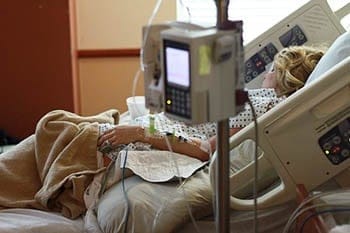 Everyone knows someone who has had a misdiagnosed illness or injury.
Everyone knows someone who has had a misdiagnosed illness or injury.
Either symptoms weren’t taken seriously, the patient felt they just weren’t listened to at all, or an incorrect diagnosis led to treatment that at best did no good and at worst caused very real harm.
If a physician fails to accurately diagnose a harmful medical condition in a timely manner, patients may in some cases be able to pursue a legal remedy by filing a medical malpractice lawsuit. However, medical malpractice laws are complex, and ‘malpractice’ isn’t as simple as ‘the diagnosis was wrong’.
Is Misdiagnosis Medical Malpractice?
Whether or not a misdiagnosis can be held as medical malpractice in a court of law depends heavily on if the physician or medical professional in question met the appropriate medical “standard of care”. How the legal system defines the medical “standard of care” is, essentially whether the doctor departed from the recognized and generally accepted standards used by average, competent practitioners in the defendants’ field of medicine under the same or similar circumstances.
In many cases the answer may be a simple “no”.
Some diseases, like certain cancers, are difficult to diagnose correctly right away, as their initial symptoms are very general and could be caused by any number of much less serious illnesses.
The most common types of misdiagnosis include:
- cancer (misdiagnosis or late diagnosis can end with painful, debilitating treatments)
- heart attacks, often misdiagnosed as panic attacks or simple indigestion
- asthma, which presents similarly to bronchitis
- inflammation of lymph nodes (which can be misdiagnosed as appendicitis)
- staph infection (often mistaken for common influenza)
- stroke (these often look like migraines or other largely minor issues)
- meningitis (this serious, and potentially fatal, disease is often misdiagnosed as migraines or the flu)
Typically, a case of misdiagnosis involves either a ‘mistaken’ diagnosis and therefore delay in correctly diagnosing the illness, or diagnostic testing is mismanaged in such a way as to ‘miss’ the diagnosis entirely.
The physician or medical team may have failed to screen for a specific medical condition, not provided specialist referrals, misinterpreted lab results, or simply failed to listen, consult with, and follow-up on the patient in the first place.
These situations are frustrating, and may be frightening for patients, but they do not always count as medical malpractice as a bad outcome or frustrating experience does not always equate to medical negligence.
On Medical Malpractice Lawsuits for Misdiagnosis
Lawsuits for medical malpractice are similar to any other kind of litigation.
The person who was misdiagnosed, as well as their legal representative, will need to show that the doctor, through their failure to provide an accurate diagnosis, did not demonstrate the level of skill or take the actions that a similarly-trained and experienced doctor could be assumed to show under the circumstances, and that failure to meet this standard of care caused harm to the patient.
While on the surface this seems like a simple task, in actuality this kind of proof can be very complex.
Who Can Be Sued for Medical Malpractice Due to Misdiagnosis?
For the most part, only the individual physician can be sued for misdiagnosis. There are circumstances where other health care professionals can also be held liable if their negligence contributed to or outright caused harm to a patient, but for the most part it will only be the physician who made the diagnosis who may be sued.
In cases in which physicians are maintained as independent contractors rather than employees of the facility they work in, a direct suit against a hospital or medical facility is usually not possible. However, if the physician is an employee of the hospital or medical facility then facility and not the doctor will be the appropriate defendant. Also, an increasing number of practices and facilities are now owned by government entities. This is an important issue to discuss with a legal representative as the statute of limitations for claims against the government are shorter than those against non-government entities.
Did the Misdiagnosis Cause Harm?
A failure to correctly diagnose an illness or injury is not in itself malpractice. In order to succeed in holding a physician liable for medical malpractice after a misdiagnosis, you’ll need to show that in addition to the negligence discussed above, the incorrect diagnosis must have also resulted in harm.
What counts as ‘harm’ in a medical malpractice case includes things like:
- the patient is exposed to a more aggressive treatment, which would not have been required if the condition had been diagnosed earlier
- needless exposure to harmful courses of treatment, such as chemotherapy or radiation
- unnecessary surgical procedures, especially if scarring or disfigurement results
- increased likelihood of complications or death
- a significant delay in the correct treatment which negatively affected the patient’s prognosis or complexity of treatment than had the condition been diagnosed earlier
In the case of death as a result of medical malpractice, a Wrongful Death suit may be something to consider.
Keep An Eye on the Statute of Limitations
In South Carolina, patients who have been harmed as a result of a misdiagnosis may need to file suit within three years if the defendant is a private entity, or within two years if the defendant is a governmental entity, from the date on which they were harmed, or could reasonably be expected to know they were harmed.
In addition, once six years have passed from the date on which the patient was harmed, the case is considered lost in South Carolina, even if the patient did not know they had been harmed due to malpractice during that time because of a legal limitation called the statute of repose.
There are some rare exceptions to the six-year limitation, such as a foreign object being left in the body (like a medical instrument or sponge after a surgery). In those cases, the lawsuit must be filed within two years from the day the presence of the object was discovered.
These limitations make it essential to seek legal representation as soon as possible to see what your options may be to recover some of the costs involved in the harm you suffered due to misdiagnosis.
Have You Suffered As a Result of Medical Malpractice?
If you or a loved one has suffered harm as a result of misdiagnosis, you may have a right of recovery against the at-fault party. You can learn more about medical malpractice here on our blog, or give us a call at (803) 674-8815 or visit our Medical Malpractice page to request your free consultation.




